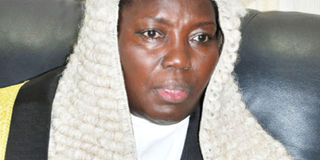Why introduce new taxes to pay off Shs100 million to former MPs?

Speaker of Parliament, Rebecca Kadaga. FILE PHOTO
What you need to know:
Implication. What does paying off former MPs with a handshake of Shs100m mean to other officers such as district chairpersons and councillors who served during the same time in local governments?
Former legislators from the 1st to 6th Parliament are expected to bag Shs100m each if the proposal by the Parliamentary Commission is approved by President Yoweri Museveni.
According to Speaker of Parliament Rebecca Kadaga, the move is aimed at recognising legislators’ contribution to the development of the nation while they were still in service. The Speaker says the Commission is waiting for the approval of President Museveni to make a one pay off to the former MPs.
It sounds fine for government to recognise its officers for the service rendered. But were these Members of Parliament not paid salary that they need to be rewarded in the evening of their careers?
The Speaker says some of the surviving members of the 1st Parliament have already been paid Shs30m each, but the President directed that they should be given Shs100m since Shs30m is considered to be too little.
This move comes a few weeks after government announced plans to introduce new taxes and increase some of the already existing taxes in the new Budget due to be read next month. Among the proposed taxes include social media tax and rental tax.
Government justified the introduction of the new taxes saying this would boost revenue collection to enable the country achieve middle income status as envisioned in the Vision 2040.
The plan to pay the ex-MPs was hatched during the independence medal awards ceremony for former parliamentarians in 2016. And since then, the Commission has been looking for the source of the money for this project.
Parliament, as an institution which legally sanctions Uganda’s Budget, must know by now how taxes are becoming a burden, even to the newly born Ugandans.
It is, therefore, surprising that this institution wants taxpayers’ money to be given to former MPs who were not volunteers during their time of service.
One of the expected beneficiaries, former West Budama South MP in the 6th Parliament, Othieno Akika, says many of their former colleagues are not employed since it is not easy to get employed after an MP leaves Parliament.
Does this statement sound any alarm bell to people who want to join Parliament immediately after completing their studies? Why is it hard for MPs to be employed after exiting Parliament? Is it because it is difficult to go back to normal life after getting used to the VIP treatment accorded to them while in service?
What does paying off former MPs with a handshake of Shs100m mean to other officers such as district chairpersons and councillors who served during the same time in local governments? Were these MPs (beneficiaries of this scheme) working in isolation of other political leaders in areas they used to represent?
Can’t an MP revert to his formal vocation or profession after exiting Parliament? Is this good use of taxpayers’ money? Aren’t these the projects that continue to create apathy towards payment of taxes amongst the population?
How many sanitary pads for girls would be procured if the money to be put in this project was rightly utilised to the benefit of all Ugandans?
The Parliamentary Commission needs to explain to Ugandans whether paying off the former legislators is part of the NRM’s Hakuna Mchezo strategy.




